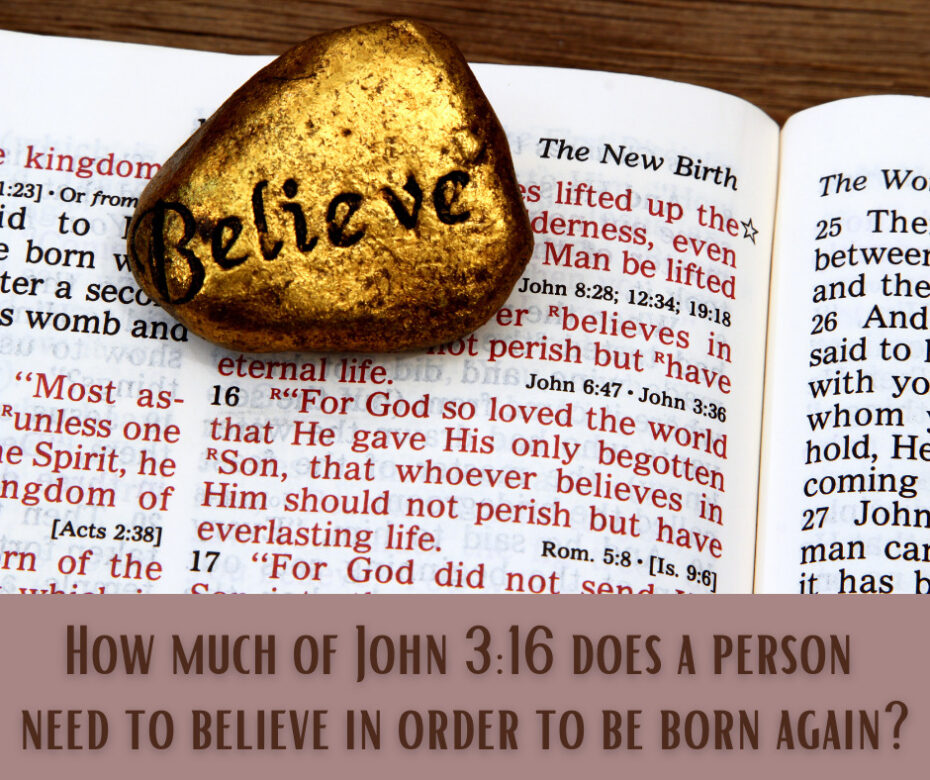I don’t use Facebook or Twitter. But Shawn does. He tells me that some people online are wondering why I or GES should be the arbiter of what Free Grace Theology (FGT) is and therefore who holds to FGT.
Every person’s eternal destiny will be based on whether he believed the saving message or not. Those who never believed it will be eternally condemned (John 3:16).
No man, other than the Lord Jesus Christ who is both God and Man, gets to pick what the saving message is. God determined what one must do to have everlasting life.
Since our ministry is devoted to clarity in evangelism and discipleship, it is obvious that we take a position on what one must do to be saved. We may be right. We may be wrong. But the way to determine whether we are right or wrong is not to conduct an online poll or to survey church history. The majority is rarely right, especially when it comes to the saving message.
The way to determine whether we are right or wrong about the saving message is to search the Scriptures (Acts 17:11). The Scriptures are not confusing on what one must do to be saved.
We don’t say that everyone will be saved. We don’t say that there are many different saving messages. We suggest that God’s Word is clear. The saving message, also called the promise of life or the message of life in the Bible, is that all who believe in the Lord Jesus Christ for everlasting life have that life. Another way of saying that is that anyone who believes that Jesus is the Christ, the Son of God, has everlasting life (John 11:25-27; 20:31; 1 John 5:1). To believe that Jesus is the Christ, the Son of God, is to believe that He guarantees everlasting life to all who believe in Him for it.
I call that view Free Grace. Other people who use that same label have a markedly different view of what one must do to be saved.
According to many who identify as Free Grace, everlasting life and justification are the results of believing in Jesus and not what we believe in Him for.
So, let’s consider what that means concerning John 5:24, 6:47, and 11:26.
John 5:24. The part of that verse one must believe to have everlasting life reads, “He who hears My word and believes in Him who sent Me.” Everything else is part of the result of believing that—a result one need not believe to be born again.
John 6:47. “He who believes in Me.” The remainder of that verse contains encouraging discipleship truth, but not material one needs to believe to be born again.
John 11:26. The saving message in this verse is found in the opening words: “He who lives and believes in Me.” The promise that the believer will never die (= has everlasting life) is not part of the saving message that must be believed in order for the new birth to occur.
It does not make sense to me that the promise of everlasting life is superfluous information.i Those shortened versions of John 5:24, 6:47, and 11:26 are incomplete thoughts. They are not even propositions that can be believed or not believed. Without the promise of everlasting life, there is no message there.
Do you think that everlasting life is superfluous information? Did the Lord Jesus?
__________
i If the promise of a secure salvation is not something we must believe to be born again, then why did the Lord Jesus mention it almost every time He evangelized? Why did He speak of the need to believe in the gift of God (everlasting life) and the Giver of the gift, Himself, the Messiah, to the woman at the well (John 4:10, 14, 25-26)? Why, after stating His promise of eternal security to all who believe in Him for it, did He ask Martha, “Do you believe this?” (John 11:26b)? And why did Paul say that he was an example for those who would believe in Jesus “for everlasting life” (1 Tim 1:16)? The practical result of seeing the promise of everlasting life as not being vital evangelistic truth is that we then view nearly everyone in Christianity as born again. All people in Christianity claim to believe in Jesus. And they all do believe some truths about Him. But most do not believe that simply by faith in Him they have everlasting life (which is what the Lord Jesus meant when He spoke of believing in Him). Of course, some who identify as Free Grace indeed say that nearly everyone in Christianity, outside of the cults, is born again. But we at GES are convinced that works salvation is not a saving message (e.g., John 5:39-40; 6:28-29; Gal 1:8-9; 2:16; Eph 2:9; Rev 22:17). Hence, we seek to evangelize our family members and friends who are devout Catholics, Orthodox, or works-salvation Protestants.


